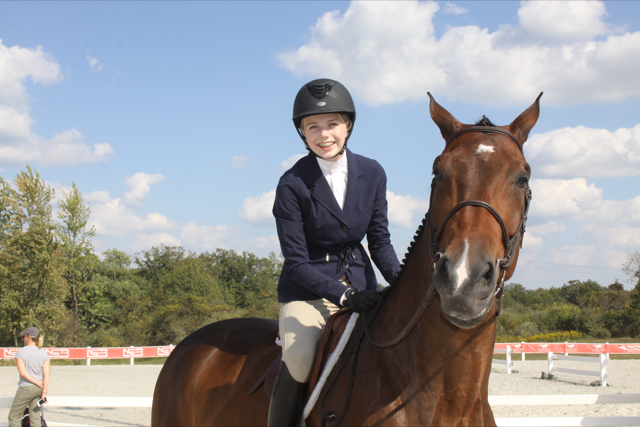Students in horseback riding gain unique, rewarding experience
Smiling for a photo with her horse, sophomore Caroline Sultz prepares for a show. According to Sultz, riding is very a competitive sport and deserves more recognition. Photo courtesy of Caroline Sultz.
January 17, 2018
Sophomore Caroline Sultz is not interested in typical sports, like basketball, football, tennis. Sultz rides horses competitively as an advanced rider along with other South students.
There are many styles of horseback riding ranging from English to Western. According to Sultz, her style is the English discipline. English riding is a form of horse riding you see throughout the world. It features a flat saddle without a deep seat. They also do not wear knee pads, unlike some Australian riders.
Styles of riding are often location distinct, capturing the unique culture of the rider. Sultz started riding when she was nine years old, after years of bothering her mom to send her to lessons. Over time, her love for riding and her horse has grown.
“It’s an individual sport as well as a partner sport because you have to get to know your horse,” Sultz said. “It teaches you how to communicate with others in different ways, as well as obtain responsibility.”
Aside from it being a competitive sport, horseback riding teaches communication and responsibility, Sultz says. To take care of her horse, Bentley, she must go to the barn, bathe him, and brush him. From this, she says she learns how to be responsible and can apply these skills to her daily life.
“It showed me how to be patient and responsible because when you’re working with a living, breathing animal that doesn’t talk, it can be frustrating,” Sultz said.
Sophomore Olivia Weber started riding when she was four years old and is an English rider. According to Weber, she was about 8 years old when she first fell off a horse after never riding before.
“We were just walking around, he started to buck and I fell off flat on my back,” Weber said. “By the time I stood up, my trainer came up to me and told me [that] I had to get back on and I thought she was insane. It’s a lesson I carry with me today in riding, and in life, that when you fall down you have to get right back up.”
Weber says she was greatly influenced by her family to begin riding. Weber’s father started riding when he was young and bought his first horse around the age of 25. Her mom used to ride as well until she was out of college. According to Weber, the horse that her father bought made her fall in love with riding.
“A huge part of the reason why I ride is because of my dad,” Weber said. “I don’t think I would love riding as much as I do or even be riding today if my dad hadn’t introduced me to it.”
Aside from being a football player, freshman Katie Pribyl has been a rider since age 5. She says that riding has helped her with breathing and staying calm in other situations, such as football. On days when she is coping with injuries or working hard in practice, going to the barn at the end of the day is a way to release her stress.
To prepare for equestrian competitions, riders must meet with their trainer the week before to practice. According to Pribyl, participating in A-shows help riders gain name recognition. A-shows are nationally rated and include a larger prize money.
When competing in shows, riders must stay calm and relaxed so that they don’t cause any surprises to the horse, according to Pribyl.
“Horses are animals that are nervous if you’re nervous,” Pribyl said. “So you have to stay really calm for them because you don’t want to get hurt.”
These students plan to continue riding outside of their high school life as well. According to each of the riders, keeping up with going to the barn, completing homework and obtaining a healthy amount of sleep all at the same time is a big commitment, but it is worth it for the rewarding time they spend on their horses.
“I plan on continuing to ride until I can’t anymore,” Weber said. “Riding is a huge part of my life and I don’t plan to give it up anytime soon.”



